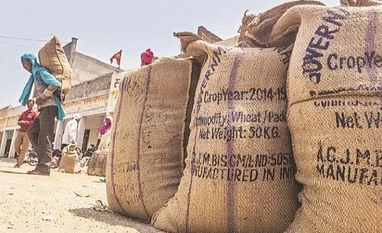The minimum support price (MSP) of crops can guarantee stable prices but not always the best rates, which can only be ensured through fair competition in the market, Niti Aayog member Ramesh Chand said on Friday.
He was addressing an agriculture conclave organised by Rural Voice, a digital media platform.
Speaking on the demand of farmer groups to make MSP a legal right, Chand noted that cultivators want it to get the best price for their produce and also to protect themselves from price fluctuations.
"In my view, MSP is not the best price in all situations. It is definitely a stable price but not the best price. Best price comes from competition. If there is competition in the market, farmers can get the best price," he said.
The government fixes MSP for 22 crops. It procures wheat and paddy for supply through ration shops under various welfare schemes. Some quantities of oilseeds and pulses are also procured.
Chand, who is also a member of the government-appointed committee on MSP, cautioned that one should not become too dependent on the MSP, adding that farmers should take advantage of market opportunities.
He further said maximum growth is being witnessed in those sectors where the government's intervention on the price front is minimum.
To press his point, he cited the rapid and sustained growth witnessed in allied sectors like dairy, fisheries and horticulture.
Therefore, Chand added, "We should not think that the MSP system could give best price in all situations and circumstances."
Observing that the MSP has its own role to play in special situations, Chand said it also kills the farmers' entrepreneurial skills to deal with the market movements.
Referring to the demand for making MSP a legal right, Chand said it will have several implications and added that three prices will have to be considered -- MSP, fair market price and actual market price.
In case the fair market price is more than the MSP, then making the support price legal would work.
However, if the fair market price is lower than the MSP, then businessmen will withdraw from the market, creating a fiscal problem for the government.
In July this year, the government formed a committee on MSP, as it had promised while withdrawing the three contentious farm laws against which farmers had been agitating for more than a year.
The committee is looking at ways to make the MSP system more effective and transparent. It will also explore other issues, including giving more autonomy to the Commission for Agricultural Costs and Prices (CACP) that fixes the MSP of crops.
(Only the headline and picture of this report may have been reworked by the Business Standard staff; the rest of the content is auto-generated from a syndicated feed.)
You’ve reached your limit of {{free_limit}} free articles this month.
Subscribe now for unlimited access.
Already subscribed? Log in
Subscribe to read the full story →

Smart Quarterly
₹900
3 Months
₹300/Month
Smart Essential
₹2,700
1 Year
₹225/Month
Super Saver
₹3,900
2 Years
₹162/Month
Renews automatically, cancel anytime
Here’s what’s included in our digital subscription plans
Exclusive premium stories online
Over 30 premium stories daily, handpicked by our editors


Complimentary Access to The New York Times
News, Games, Cooking, Audio, Wirecutter & The Athletic
Business Standard Epaper
Digital replica of our daily newspaper — with options to read, save, and share


Curated Newsletters
Insights on markets, finance, politics, tech, and more delivered to your inbox
Market Analysis & Investment Insights
In-depth market analysis & insights with access to The Smart Investor


Archives
Repository of articles and publications dating back to 1997
Ad-free Reading
Uninterrupted reading experience with no advertisements


Seamless Access Across All Devices
Access Business Standard across devices — mobile, tablet, or PC, via web or app
)

